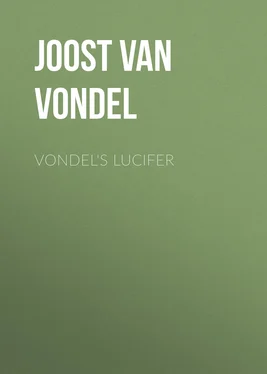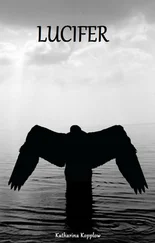Joost Vondel - Vondel's Lucifer
Здесь есть возможность читать онлайн «Joost Vondel - Vondel's Lucifer» — ознакомительный отрывок электронной книги совершенно бесплатно, а после прочтения отрывка купить полную версию. В некоторых случаях можно слушать аудио, скачать через торрент в формате fb2 и присутствует краткое содержание. Издательство: Иностранный паблик, Жанр: foreign_dramaturgy, Драматургия, foreign_antique, foreign_prose, на английском языке. Описание произведения, (предисловие) а так же отзывы посетителей доступны на портале библиотеки ЛибКат.
- Название:Vondel's Lucifer
- Автор:
- Издательство:Иностранный паблик
- Жанр:
- Год:неизвестен
- ISBN:нет данных
- Рейтинг книги:5 / 5. Голосов: 1
-
Избранное:Добавить в избранное
- Отзывы:
-
Ваша оценка:
- 100
- 1
- 2
- 3
- 4
- 5
Vondel's Lucifer: краткое содержание, описание и аннотация
Предлагаем к чтению аннотацию, описание, краткое содержание или предисловие (зависит от того, что написал сам автор книги «Vondel's Lucifer»). Если вы не нашли необходимую информацию о книге — напишите в комментариях, мы постараемся отыскать её.
Vondel's Lucifer — читать онлайн ознакомительный отрывок
Ниже представлен текст книги, разбитый по страницам. Система сохранения места последней прочитанной страницы, позволяет с удобством читать онлайн бесплатно книгу «Vondel's Lucifer», без необходимости каждый раз заново искать на чём Вы остановились. Поставьте закладку, и сможете в любой момент перейти на страницу, на которой закончили чтение.
Интервал:
Закладка:
Under cover of the ancient legend of Palamedes, which lent itself most readily to such analogy, he had portrayed the murder of the old Advocate, and painted his judges in such strong colors and with such accurate delineation that each was recognized, and forever invested with the shame and infamy he so richly merited.
The greatest excitement prevailed, and the first edition of the poem was sold in a few days. The Goliath of error, slain by the pebble of satire, lay on the ground, gasping in agony. The David who had with one swift arm-swing of thought accomplished this wonderful feat, suddenly found himself the most famous man in both camps.
In the meantime the party in power sought to repress the book; and as the poet was thought to be in danger of imprisonment, or of even a more tragic fate, he was advised by his friends to go into hiding, which he did.
Threats were made against the man who had so rashly dared the fury of those relentless iconoclasts—the reigning Gomarists. It was muttered that he ought to be taken to The Hague to be tried, even as Oldenbarneveldt.
Meanwhile Vondel was concealed at the house of Hans de Wolff, a brother of his wife, who was also married to his sister Clementia. They were, however, afraid to harbor him any longer; and his sister, it is said, upbraided him for his itch for writing, saying that no good could come of it, and that it would be better for him to attend more strictly to his business.
Vondel's only reply was, "I shall yet tell them sharper truths;" and he straightway sat down and wrote some cutting pasquinades. These, however, upon his sister's advice, he threw into the fire, which he afterwards regretted.
He next found shelter in the house of a friend, Laurens Baake, who received him gladly. Here he was hidden several days; and the sons and daughters of his host, being highly cultivated and exceedingly fond of poetry, were much pleased with the society of so distinguished a poet, and for him made things as comfortable as possible. Vondel ever proved grateful for the many favors received at their hands in the hour of his need.
His hiding-place was at last discovered, and he was brought before the court. The plea made by his lawyer in his behalf was that the play "was poet's work and could be otherwise interpreted than was commonly done."
Some of the judges expressed themselves very severely; and if their counsel had prevailed there is no doubt but that the poet's career would have ended with the "Palamedes." However, the old Batavian spirit also asserted itself, others saying that civil liberty was but a mockery when a man was no longer allowed the freedom of speech. The result of the trial was that Vondel was fined three hundred guldens, which was paid by a friend—indeed, by one of the judges themselves—who was secretly favorable to Vondel and his party, and had encouraged the poet to write this very drama. We are here reminded of the fate of the great Florentine. Dante, a patriot, yet an exile, accused of treason, and under sentence of death; Vondel, forced to flee from an oligarchy of unctuous hypocrites, in fear of his life, and arraigned as a fomenter of discord. The ideas of the great Hollander on government, and on politics also, were not unlike the ideal Ghibellinism of the illustrious Tuscan.
Of course, the very nature of the play made it popular, and the various attempts at its suppression only made it more so. Two other editions shortly followed. Within a few years thirty editions were sold. " Nitimur in vetitum semper cupimusque negata. "
Prince Maurice, the Stadholder, whose powerful personality on account of his share in the death of the Advocate was also severely handled by the poet, died while Vondel was giving the finishing touches to his drama. Long years afterwards, when the poet was an old man, he was wont to relate how on the very morning that the news came to Amsterdam from The Hague that the Stadholder was on his death-bed, his wife came to the foot of the stairs that led to the room where he was writing, and cried, "Husband, the Prince is dying!"
To which he replied:
"Let him die! I am already tolling his knell."
Frederic Henry, who was the next Stadholder, was known to be at heart in favor of the Remonstrants.
It was reported that the whole tragedy was read to him in his palace, and that he was exceedingly pleased with it, finding much of interest in the various episodes. Strange to say, upon the walls of the room where he heard the drama hung a piece of tapestry upon which the history of the Greek Palamedes was artistically pictured. Pointing to this, the Prince said mockingly, "This tapestry should be taken away, otherwise they might suppose that I also favor the cause of Palamedes."
Apart from its influence on the time, and the interest of its allegorical allusions, the "Palamedes" is a splendid tragedy, and its intrinsic worth alone would make it immortal. One of the choruses, especially, is justly celebrated for its idyllic beauty. It has often been compared to the "L'Allegro" of Milton, and, indeed it bears, in many particulars, much resemblance to that exquisite lyric.
Soon after the completion of the "Palamedes," Vondel was again for a long time in a state of hopeless melancholy. He did not yield to its depressing influence, however, and at the age of forty began the study of Greek, in which he made rapid progress.
He still associated with his fellow-Academicians, though no longer at the home of Roemer Visscher.
This patron of learning had now been dead for several years. Other changes also had taken place. Starter, after the publication of his "Frisian Bower," seized with the spirit of adventure, had enlisted as a private soldier, and died, a few years afterwards, in one of the battles of the Thirty Years' War. Laurens Reael had gone to the Indies, and, after winning the highest honors as soldier and statesman, had come back again to his native land, which he continued to serve in a diplomatic capacity for many years.
Hooft had been honored by Prince Maurice with one of the highest dignities in the state. He had been appointed Judge of Muiden; and here, in his castle, in the society of his lovely wife and beautiful children, he gave himself up to his books. It was here in his "little tower," one of the four turrets of this castle, that he wrote his splendid history. Here he composed many of those charming lyrics that combine the lusciousness of the Italian after which they were modelled, with the domestic sweetness of the Dutch. Here, too, he wrote his great tragedies, "Baeto, or the Origin of the Hollanders," and "Gerardt van Velsen." Hooft was essentially a student and a scholar; a thinker rather than a fighter. He did not, therefore, like Vondel, the burgher, plunge with flaming soul into the conflict. The patrician was too fond of studious contemplation and of elegant ease to allow the discord of the outside world to mar the serene harmony of his retirement.
Brederoo had burnt himself out with the intensity of his passion for his adored, but not adoring, Tesselschade. Poor fellow! after all his poetic wooing and flattering dedications, he had met with the bitter disappointment of a refusal; and, after a meteoric career, died, at the age of thirty-six, a heart-broken man. The delicate lyre-strings on that Æolian harp had been snapped by the rude blast of unrequited love, and from the broken chords now surged the mournful music of the grave. His dazzling genius—eclipsed in its noon-tide splendor by the swift night of death—was quenched forever. Such was the sad but romantic ending of the most brilliant man of his age, the greatest humorist that Holland has yet produced.
And Tesselschade, the beautiful inspirer of this passion? To her, too, time had brought its changes.
Neptune's trident, it seems, had more attraction for her than the lyre of Apollo, whose strings she had so often set into melodious vibration. After being wooed for a whole decade by all the younger poets, she had at last been won by a gallant sea-captain, Allart Krombalgh, and was now living happily in blissful quiet with her husband at Alkmaar.
Читать дальшеИнтервал:
Закладка:
Похожие книги на «Vondel's Lucifer»
Представляем Вашему вниманию похожие книги на «Vondel's Lucifer» списком для выбора. Мы отобрали схожую по названию и смыслу литературу в надежде предоставить читателям больше вариантов отыскать новые, интересные, ещё непрочитанные произведения.
Обсуждение, отзывы о книге «Vondel's Lucifer» и просто собственные мнения читателей. Оставьте ваши комментарии, напишите, что Вы думаете о произведении, его смысле или главных героях. Укажите что конкретно понравилось, а что нет, и почему Вы так считаете.












